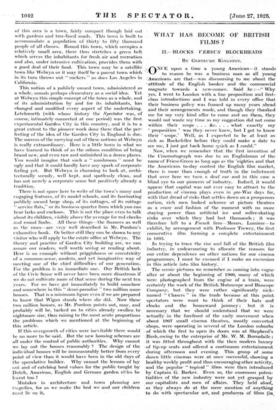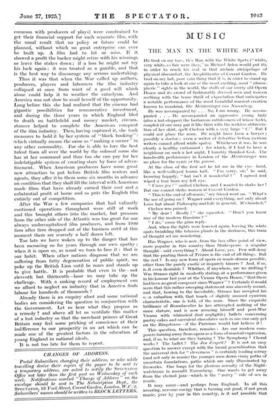WHAT HAS BECOME OF BRITISH FILMS ?
II.—BLOCKS VERSUS BLOCKHEADS
BY GERTRUDE KINGSTON.
ONCE upon a time a young American—it stands . - to reason he . was a business man as all young :Americans are that—was discoursing to me about the -attitude of the English banker and -the • commercial magnate towards a new-comer. Said he :—" Why yes, I went to London with a fine proposition and first- class introductions and I was told in every office that me for my very kind offer to come and see them, they would not waste my time as my suggestion did not come . within their scope . . . &c. . . . what exactly my proposition ' was they never knew, but I got to know • their .` scope Well, as I expected to be at least as rich as Rockefeller before they could make a date to see me, I just got back home quick as I could."
Now, when we remember that the first invention of the Cinematograph was due to an Englishman of the name of Friese Green as long ago as the 'eighties and that the Americans to-day control the English film market, . there is more than enough of truth in the indictment that over here we turn - a deaf ear and in this case a blind eye to our pioneers of industry. Indeed, it would appear that capital was not ever easy to attract to the production of cinema plays even in pre-War days for, with that dread of risks that settles down on a prosperous nation, rich men looked askance at picture theatres as a craze and fashion of the moment with no more staying power than artificial ice and.. roller-skating rinks over which they had lost thousands ; it was • therefore left to a French - firm--Messrs. Lumiere—to exhibit, by arrangement with Professor Trewey, the first consecutive film forming a • complete entertainment in 1895. • - • In trying to trace the rise and fall of the British film industry, in endeavouring to allocate the reasons for our entire dependence on other nations for our cinema programmes, I must be excused if I make an excursion in this article into film history. - , The scenic pictures we remember as coming into, vogue after or about the beginning of 1900, many of which were photographed - from the engine of a train, were certainly the work of the British- Mutoscope and Bioscope Company, but • they were rather significantly nick- named " Chasers- " in .the trade because at this point spectators were wont to . think of their hats and cloaks and the homeward journey ; . but it is necessary that we should understand that we were actually in the forefront of the early movement when about 1907 small cinema theatres, mostly converted shops, were-operating in several -of the London suburbs' of which the first to open its doors was at Shepherd's • Bush,--owing to the enterprise of Mr. W. M. Borradaile ; it was fitted throughout with the then modern luxury • of tip-up seats and offered a continuous entertainment during afternoon and evening. This group of some dozen little cinemas were at once successful, showing a healthy weekly profit and thus encouraging other activity, and the popular "-topical " films were then introduced by Captain G. Barker. Even so, the enormous poten- tialities la, the_ new industry were not yet grasped by ,our capitalists . and men of affairs. They held aloof, .as they always do at the _ mere mention of anything to do with spectacular art, and producers of films (in, common with producers of plays) were constrained to get their financial support for each separate film, with the usual result that no policy or future could be planned, without which no great enterprise can ever be built up. A film had to hit or miss. If it showed a profit the backer might retire with his winnings or leave the stakes down ; if a loss he might not try his luck again : it was treated as a gamble, and that is the best way to discourage any serious undertaking.
Thus it was that when the War called up authors, producers, players and labourers the film industry collapsed at once from want of a good will which alone could help it to weather the cataclysm. And America was not slow to avail herself of the opportunity. Long before this she had realized that the cinema had gigantic possibilities for remunerative investment, and during the three years in which England bled • to death on battlefield and money market, circum- stances helped to complete the American conquest of the film industry. Then, having captured it, she took measures to hold it by her system of " block booking": ;which virtually means the same as " making a corner" in 'any other commodity. For she is able to lure the best talent from all over the world by the colossal sums she has at her command and thus too she can pay for her indefatigable system of creating stars by force of adver- tisement. . When American producers have some great -new attraction to put before British film renters and agents, they offer it to them some six months in advance on condition that they shall fill the interval with American made films that have already earned their cost and a substantial profit at home and so puts the English film entirely out of competition.
After the War a few companies that had valiantly continued operations throughout were still at work and this brought others into the market, but pressure from the other side of the Atlantic was too 'great for our always undercapitalized film producers, and from 1920 firm after firm dropped out of the business until at this :moment there are scarcely a half dozen left.
Too late we have woken up to the danger that has been menacing us for years through our own apathy : when it is upon us, as usual we turn to face it : that is our habit. When other nations diagnose that we are suffering from fatty degeneration of public spirit, we poke up the British Lion until he roars and stands up to give battle. It is probable that even in the--not eleventh but - thirteenth—hour we may take up the challenge. With a sinking record of employment can we afford to neglect an industry- that in America finds labour for hundreds of thousands ?
Already there is an enquiry afoot and some national 'bodies are considering the question in conjunction with the Government. Let us hear what they propose as a remedy ? and above all let us ventilate this matter of a lost industry so that the merchant princes of Great Britain may feel some pricking of conscience at their indifference to our prosperity in an art which can be made one of the greatest factors in the education of young England in national ideals. ' It is not too late for them to repent.











































 Previous page
Previous page